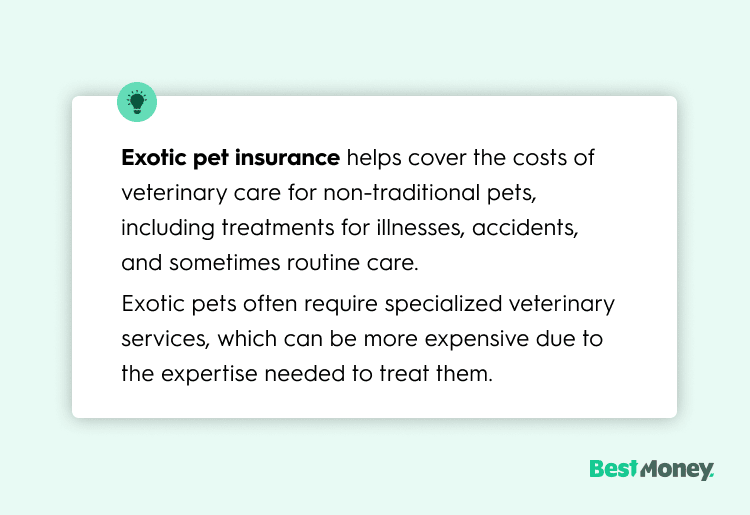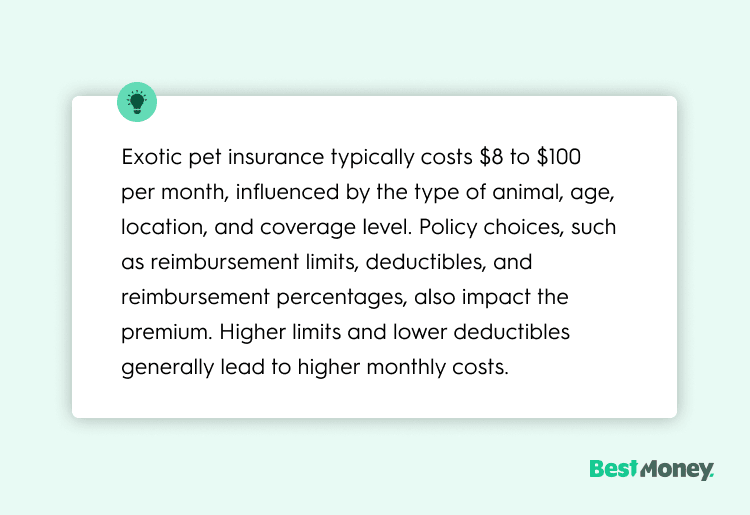
Non-traditional pets like birds, reptiles, rabbits, and even potbellied pigs are just as prone to accidents, illnesses, and medical emergencies as their feline or canine counterparts, which is why exotic pet insurance is essential for responsible exotic pet owners.
This article will walk you through everything you need to know about insuring exotic pets. You’ll learn about the various coverage options available, which types of exotic pets can be insured, and tips for selecting the right policy to protect your beloved companion. Whether you have a bird, reptile, or other exotic animal, we’ll help you find the right insurance plan to safeguard your pet’s health and well-being.
» Looking for the perfect fit for your special pet? Explore our best pet insurance companies to find the right plan.
What Is Exotic Pet Insurance?
Exotic pet insurance is a specialized type of coverage designed for animals that aren't typically covered by traditional pet insurance plans, such as birds, reptiles, rabbits, guinea pigs, hedgehogs, and more.
This insurance helps cover the costs of veterinary care for these non-traditional pets, including treatments for illnesses, accidents, and sometimes routine care. Exotic pets often require specialized veterinary services, which can be more expensive due to the expertise needed to treat them.
Having exotic pet insurance ensures that you are financially prepared for the unique medical needs of your unique companions
Pets covered by exotic pet insurance:
Amphibians
Birds
Chameleons
Chinchillas
Ferrets
Geckos
Gerbils
Goats
Guinea pigs
Hamsters
Hedgehogs
Iguanas
Lizards
Mice
Opossums
Potbellied pigs
Rats
Rabbits
Snakes
Sugar gliders
Tortoises
Turtles

What Does Exotic Pet Insurance Cover?
Exotic pet insurance provides coverage for a variety of medical situations that non-traditional pets may face. This includes accidental injuries, such as fractures or wounds, and serious illnesses like infections or cancers. It also typically covers common illnesses such as respiratory infections, chronic conditions like diabetes, and hereditary issues that may arise in specific breeds. For example, birds and parrots often suffer from feather-plucking disorders, while guinea pigs may suffer from hereditary heart disease. In addition, exotic pet insurance usually covers hospitalization for serious health concerns, along with necessary lab work for diagnosing issues. Depending on the plan, treatments for both emergency and ongoing care can be included, ensuring comprehensive coverage for your pet’s health.
» Want to find out more about what pet insurance can cover? Read more about pet insurance coverage here.
What Doesn't Exotic Pet Insurance Cover?
Exotic pet insurance typically excludes the following:
Pre-existing conditions: Any illness or injury your pet had before coverage began.
Cosmetic procedures: Treatments such as declawing, wing clipping, or cosmetic surgeries.
Breeding-related issues: Costs associated with breeding, pregnancy, or birth complications.
Elective procedures: Non-essential surgeries or treatments like neutering or spaying.
Behavioral treatments: Costs for addressing behavioral issues such as aggression or anxiety.
Experimental treatments: Any procedures or treatments not widely accepted by veterinary standards.
Preventive care (unless specified): Routine wellness exams, vaccinations, or dental care if not included in the policy.
Always review the policy carefully to understand specific exclusions.
» Have a pet with a pre-existing condition? Figure out your options with our guide on pet insurance with pre-existing conditions.
How Much Does Exotic Pet Insurance Cost?
Given the many needs of birds, reptiles, amphibians, and other exotic pets, you would guess exotic pet coverage would cost more than just regular pet insurance. Surprisingly, this isn’t the case. Exotic pet insurance premiums generally cost anywhere from $8 to $100 per month.
Exotic pet insurance differs in price according to the type of animal you need to insure. Other things like age, location, and amount of coverage you decide to get factor the price you’ll pay.
When you buy pet insurance–whether regular or exotic–you usually get to make certain choices that affect the cost of the policy. These choices include,
The annual reimbursement limit, which can range from $5,000 to $10,000 or unlimited
The annual deductible, which can range from $100 to $1,000
The reimbursement percentage, which usually ranges from 70% to 90%. The higher the reimbursement limit, the lower the annual deductible, and the higher the reimbursement percentage–the higher the monthly premium.
What Are the Benefits of Exotic Pet Insurance?
Customizable coverage: Pet owners can adjust the reimbursement limit, annual deductible, and reimbursement percentage to fit their needs and budget.
Free annual check-ups: Many plans include annual check-ups at no additional cost, helping with routine care.
Bonus reimbursements: Some providers cover additional costs, such as reimbursing expenses if you cancel a vacation due to a pet’s medical emergency.
Growing market: Increased competition in the pet insurance industry benefits exotic pet owners, providing more options and competitive pricing.

What Are the Drawbacks of Exotic Pet Insurance?
- Fewer options for exotic pets: It may be more difficult to find a pet insurance company that outright covers exotic pets, compared to standard pet insurance for cats and dogs.
Monthly premium: Depending on the coverage and the pet’s health, premiums can be expensive.
Restrictions on pre-existing conditions: Exotic pets with pre-existing conditions or those that are older may face higher premiums or be excluded from coverage altogether.
Restrictions on older pets: Older exotic pets may face limitations or outright denial of coverage.
Exclusions for behavioral issues: Treatments for behavioral problems, such as aggression or anxiety, are often excluded.
Annual claim limits: Most insurance plans have a cap on the amount you can claim for veterinary expenses within a year, limiting the total benefit.
How to Choose the Best Exotic Pet Insurance Policy
Choosing the right exotic pet insurance policy requires careful consideration of several factors to ensure your pet gets the coverage it needs. Here are some tips and tricks to help guide your decision:
Compare providers: Start by reading reviews and customer feedback to get a sense of each insurance provider’s reputation. While there are fewer options for exotic pets, understanding how providers handle claims and customer service is essential.
Understand coverage details: Look beyond the monthly premium. Compare deductibles, reimbursement rates, and annual limits. Make sure to review the fine print to know exactly what’s covered, including exclusions like pre-existing conditions or specific treatments.
Evaluate available plans: Currently, Nationwide is the leading provider of exotic pet insurance, offering coverage for birds, amphibians, and other exotic animals. However, consider alternative options like veterinary discount plans from Pet Assure, which offer a 25% discount on vet visits and have minimal exclusions.
Consider your pet’s needs: If your exotic pet is older or has pre-existing conditions, traditional insurance may be expensive or unavailable. In such cases, a veterinary discount plan, which guarantees savings on virtually all vet visits, may be a more affordable option.
Stay informed: The market for exotic pet insurance is still developing. Keep an eye on emerging providers and new coverage options to ensure you find the best policy for your unique pet.
By following these tips, you can make an informed choice and secure the best possible protection for your exotic pet.
Bottom Line
Exotic pets, like birds, reptiles, and small mammals, require specialized care, which can be costly. Exotic pet insurance helps pet owners manage the financial burden of veterinary care, offering coverage for accidents, illnesses, and routine care. While there are fewer insurance options for exotic pets compared to cats and dogs, Nationwide and Pet Assure provide coverage and discount plans. When choosing the best exotic pet insurance, it's important to compare providers, review policy details, and consider your pet's unique needs.






